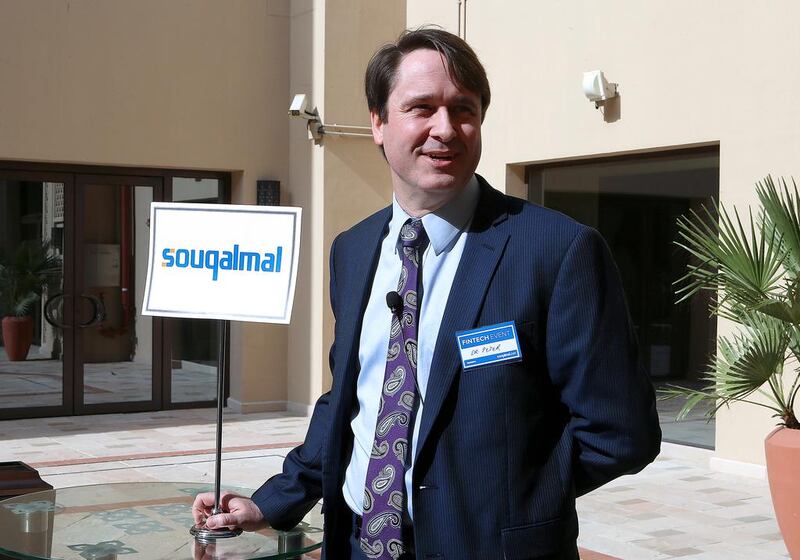Charles Darwin once said “it’s not the strongest of the species that survives, it is the one that is most adaptable to change”.
Here in the UAE, the financial services industry is currently facing a wave of change thanks to rapid advances in technology.
And experts say if providers aren’t able to recognise the new industry threats and adapt, it could mean the start of the end for some institutions.
“Banks are bundles of services. They won’t just go away completely, however, the challenge is they will get unbundled and services will be provided by other companies,” says Peter Zemsky, deputy dean and professor of strategy at Insead, speaking at a recent fintech (or financial technology) event hosted by the UAE-based price comparison site Souqalmal.com in collaboration with Google and Insead.
Mr Zemsky points to international start-ups such as TransferWise, a foreign exchange platform, Square, a point of sale solution and Lending Club, a peer-to-peer investment and lending service, as companies that are already “starting to disrupt the industry”.
The financial crisis of 2008-09 caused a significant shift in the world of banking. Institutions drew up the drawbridges and stopped lending as freely as they once had and came under increasingly heavy amounts of regulation to prevent another catastrophe.
But with the advent of technology, particularly smartphones, and customers now demanding far more from their banks – asking why can’t I do this on my mobile, rather than go to a branch – new players are filling the gap.
Here in the UAE, a range of start-ups have sprung up to offer innovative alternatives to the traditional banks. Companies such as PayFort, an online payment provider, Bridg Payment Solutions, a payment transaction facilitator and Beehive, a peer-to-peer (P2P) lending platform have emerged. These along with Democrance, a mobile micro-insurance company and Pi Slice, a micro-financing business, are all catering to demands that are not currently serviced by the banks.
Moussa Beidas, chief executive of Bridge Payment Solutions, launched in the UAE last year, offers a technology that overcomes some of the barriers to entry of mobile banking. Its Bluetooth Low Energy (BLE) connectivity enables merchants to charge a consumer’s smartphone without needing a data connection.
“While the UAE may have one of the highest smartphone penetration rates in the world, many consumers in the lower income bracket are not actually using these devices connected to a network. They use them as tablets and connect only to Wi-Fi, which prevents them using the device for mobile payments,” says Mr Beidas. “By using Bluetooth we’ve overcome this issue and signing up for our service only takes 72 hours instead of the 35-45 days it can take to sign up to a payments system with a traditional bank.”
Craig Moore, founder and chief executive of the UAE-based Beehive, set up in 2014, says many SMEs turn to platform after struggling to deal with the long approval times and high finance costs that traditional financial providers offer.
“P2P finance offers SMEs faster access to finance at a lower cost and a more flexible option,” he explains. “The banking industry now views crowdfunding as more of an opportunity. Collaborating with P2P platforms creates synergies that benefit not only banks and SMEs, but the entire economy too.”
Omar Soudodi, managing director at UAE-based Payfort, which allows businesses to trade with banked and non-banked online shoppers, agrees. He says companies such as his are not designed to replace the banks.
“What I see is fintech companies becoming a layer between banks and consumers,” he says. “New companies can often make certain processes quicker and more efficient than the traditional banks. However, it takes a long time and a lot of investment to get a banking licence. Most start-ups are looking to see what can be done without the need for a licence. My belief is fintech companies will support the banks and partner with them rather than replacing them.”
Until now Middle East financial institutions wanting to stay current have been hampered to some extent by regulations. Current UAE rules still require a “wet” signature on financial undertakings, so at present credit cards, insurance and other financial products cannot be bought online. There are indications that this will soon change, however.
“Many regional governments are empowering banks to make these changes and allowing them to undertake some very ambitious expansive programs focused on innovation and digital transformation,” says Mr Zemsky. At the recent NBAD Global Financial Markets Forum, Ahmed Al Sayegh, chairman of Abu Dhabi Global Market, announced a plan for Abu Dhabi to become the fintech capital in the Gulf.
“The UAE seems more enlightened in the way they are regulating,” he says. “The whole world is going mobile. If you can get it right here, the world is your oyster.”
While many banks already have mobile banking apps in place, there are signs more change is coming.
Emirates Islamic bank recently ran an “appathon”, or app development competition, to allow students and professionals the chance to create the next banking app.
Only time will tell which institutions will adapt most successfully and survive, and which will become a footnote in history.
business@thenational.ae
Follow The National's Business section on Twitter





